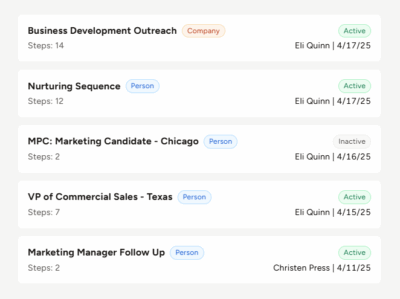Candidates are the heart of any recruiter’s business. They drive the entire placement process, and how they perceive their interaction with you—the recruiter—can shape the success of your hiring strategies. In today’s competitive landscape, it’s not enough to find the best talent; you also need to keep them engaged throughout the recruitment journey. If you overlook the Candidate Experience, you risk losing top candidates to other recruiters who offer a more seamless, engaging, and respectful experience.
In the digital age, candidates expect a smooth and professional hiring process. With countless digital tools available, there is little excuse for not providing a stellar candidate experience. Prioritizing this not only strengthens your relationship with candidates but also builds your reputation as a recruiter who genuinely cares about the people they work with.
In this article from Top Echelon Recruiting Software, we’ll explain how the mastering the candidate experience is the key to successful recruiting.
The Importance of the Candidate Experience
The Candidate Experience encompasses everything a job seeker goes through while interacting with you or your company—from the initial job posting, through the application and interview process, to the final offer (or rejection). When done well, it leads to positive relationships, successful placements, and even future referrals. However, if neglected, it can turn job seekers off from your opportunities and tarnish your reputation.
Why it Matters
- Candidates are your business’s lifeblood: Without candidates, there are no placements, no commissions, and no future opportunities.
- Your reputation is on the line: Candidates talk. They share their experiences with others, particularly on platforms like LinkedIn, Glassdoor, and social media.
- First impressions last: The way you treat candidates from the outset reflects on your professionalism and the companies you represent.
- Candidates are consumers: Today’s candidates expect the same level of customer service in their job search that they receive as consumers. A bad experience can push them away from your opportunities.
Consequences of Poor Candidate Experience
A bad candidate experience has direct consequences. Candidates may refuse future opportunities, warn others, or spread negative feedback about your process. A study by CareerArc revealed that 72% of candidates who had a negative experience shared it online or directly with someone, damaging not only your brand but also your future hiring prospects.
By taking control of the Candidate Experience, you set both yourself and your candidates up for success. Let’s explore how to refine each step of the recruitment process to ensure a positive experience.
1. Prioritize Communication
One of the most critical elements of the Candidate Experience is communication. As recruiters, it’s easy to get caught up in managing multiple processes at once. However, it’s important to remember that for the candidate, this process represents a potentially life-changing opportunity. Poor communication can leave candidates feeling anxious, undervalued, and frustrated.
Effective Communication Strategies
- Be Timely: Whether delivering good news or bad, timely communication is key. If a candidate has applied for a job or completed an interview, don’t leave them waiting. Respond to applications promptly and provide updates throughout the hiring process.
- Set Clear Expectations: Outline the steps of the hiring process, including the timeline, next steps, and what candidates can expect from you. Setting these expectations from the beginning helps manage the candidate’s anxiety and provides them with a clear picture of what lies ahead.
- Offer Feedback: Whether a candidate moves forward or not, providing constructive feedback is invaluable. Offering candidates insights into their performance helps them improve and demonstrates that you value their effort.
- Never Leave Candidates Hanging: If a candidate doesn’t make it through to the next stage, don’t just disappear. Send a rejection email that expresses gratitude for their time and keeps the door open for future opportunities. Giving every candidate closure improves their perception of your process, even if they weren’t selected.
Leveraging Technology to Improve Communication
Many Applicant Tracking Systems (ATS) can assist in streamlining communication. Here’s how:
- SMS Messaging: With an open rate close to 100%, SMS messaging is far more effective than email for immediate communication. Use it to confirm interviews, provide reminders, or deliver quick updates.
- Automated, Personalized Emails: An ATS allows you to set up automated email workflows, ensuring that candidates receive timely updates throughout the process while still maintaining a personal touch.
- Calendar Sync and Meeting Scheduler: Scheduling interviews can often be a time-consuming process. Offering candidates a hassle-free way to select interview slots using a synced calendar system eliminates back-and-forth emails and simplifies the experience.
- Resume Parsing: Simplify the application process by using ATS systems that can parse resumes quickly. This reduces the time candidates spend filling out lengthy application forms and increases application completion rates.
2. Provide Valuable Insights
A job interview is a two-way street. While it’s an opportunity for you and your client to assess a candidate’s fit, it’s equally important for the candidate to gauge whether the role and company culture align with their values and career aspirations. Offering candidates valuable insights into the role and the company gives them a clearer picture and makes the process more transparent.
How to Offer Insights
- Company Culture: Share what it’s like to work at your client’s company. Highlight core values, company mission, team structure, and work culture. Use testimonials, videos, or employee stories to offer an authentic view of the workplace.
- Growth Opportunities: Candidates want to know that they’re not just filling a role but also embarking on a career path. Share information about learning opportunities, career growth potential, and internal promotion policies.
- Job-Specific Details: Be transparent about the job’s day-to-day responsibilities, expectations, and challenges. Providing detailed job descriptions or linking candidates to resources where they can learn more about the position builds trust and helps candidates make informed decisions.
By offering these insights, you not only attract the right candidates but also demonstrate that you care about their long-term success.
3. Be Fair and Inclusive
Fairness is a fundamental pillar of the Candidate Experience. Every candidate, regardless of background, deserves an equal opportunity to succeed. In an age where Diversity, Equity, and Inclusion (DEI) are critical to workplace success, your recruitment process must reflect these principles from the outset.
How to Promote Fairness in Recruitment
- Blind Resume Screening: Using an ATS or recruiting software, you can hide personal information such as names, genders, and ethnicities during the resume review process. This ensures that you’re evaluating candidates solely on their qualifications and skills.
- Structured Interviews: Implement structured interviews where each candidate is asked the same set of questions. This eliminates biases that may arise from unstructured, conversational interviews.
- Evaluate Based on Skills and Experience: While resumes give an overview of qualifications, using pre-screening assessments to measure specific skills can offer a clearer picture of a candidate’s capabilities.
- Feedback Loops: After the recruitment process, collect feedback from candidates and your hiring team to continuously refine your approach. Ensure that fairness and inclusivity are at the core of your recruitment strategy.
4. Pre-Screening and Assessments
To give candidates an idea of what the job entails, many companies are now incorporating pre-screening assessments into the recruitment process. These assessments provide candidates with a glimpse of the skills and knowledge required for the position, while allowing hiring managers to gauge a candidate’s proficiency before proceeding to the next step.
Benefits of Pre-Screening
- Save Time: Pre-screening assessments help eliminate unqualified candidates early in the process, saving both you and the candidate time.
- Candidate Engagement: Pre-screening assessments actively engage candidates by giving them an opportunity to showcase their skills.
- Personalized Feedback: After the assessment, providing candidates with constructive feedback can set your process apart from others. Even if a candidate isn’t selected, feedback allows them to learn and improve for future opportunities.
By incorporating pre-screening assessments, you create a more efficient, engaging, and informative process for both candidates and hiring managers.
5. Engage Beyond the Basics
Engaging with candidates is more than just regular communication—it’s about creating a meaningful connection. When candidates feel that they are treated as individuals rather than just another applicant, they are more likely to have a positive experience and speak highly of your process.
Ways to Deepen Engagement
- Personalized Interactions: Go beyond the transactional approach. Take the time to understand what motivates each candidate, their personal interests, and career goals. Treat candidates as future colleagues rather than just numbers in a recruitment funnel.
- Active Listening: During interviews, ask candidates about their passions, interests, and personal goals. Taking the time to listen and engage in meaningful conversation shows that you care about their overall well-being, not just their technical qualifications.
- Follow-Up Conversations: Even if a candidate isn’t selected for a role, maintain the relationship by staying in touch for future opportunities. Follow-up conversations after interviews or rejection emails can keep candidates in your talent pool for later placements.
By engaging with candidates on a deeper level, you can build trust, foster relationships, and leave candidates with a positive impression, even if they aren’t hired.
The Candidate Experience as a Competitive Advantage
In today’s competitive recruitment landscape, offering a superior Candidate Experience is no longer optional—it’s a necessity. How you treat candidates throughout the hiring process not only affects your ability to attract top talent but also influences your reputation and future business prospects.
By focusing on communication, providing valuable insights, promoting fairness, implementing pre-screening assessments, and deepening engagement, you can ensure that candidates walk away with a positive view of your process—even if they aren’t hired. A good Candidate Experience isn’t just about filling a job; it’s about building relationships, creating lasting impressions, and setting the foundation for long-term success.
Make the Candidate Experience your competitive edge, and you’ll not only land top talent but also create a network of advocates who speak highly of your process, expanding your reach and success as a recruiter.








